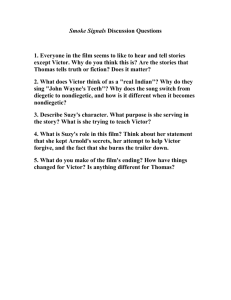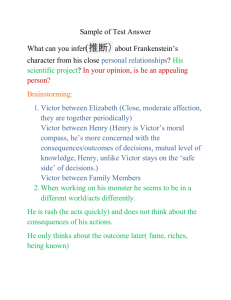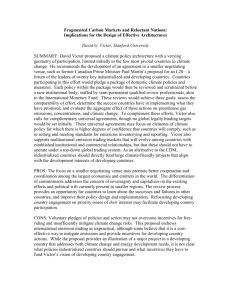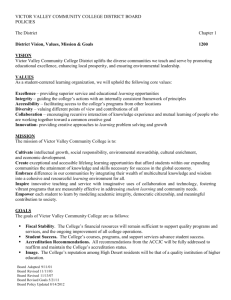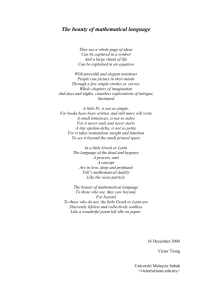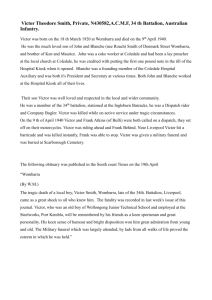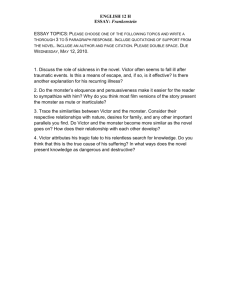Chapter 1-2 analysis and quotes
advertisement
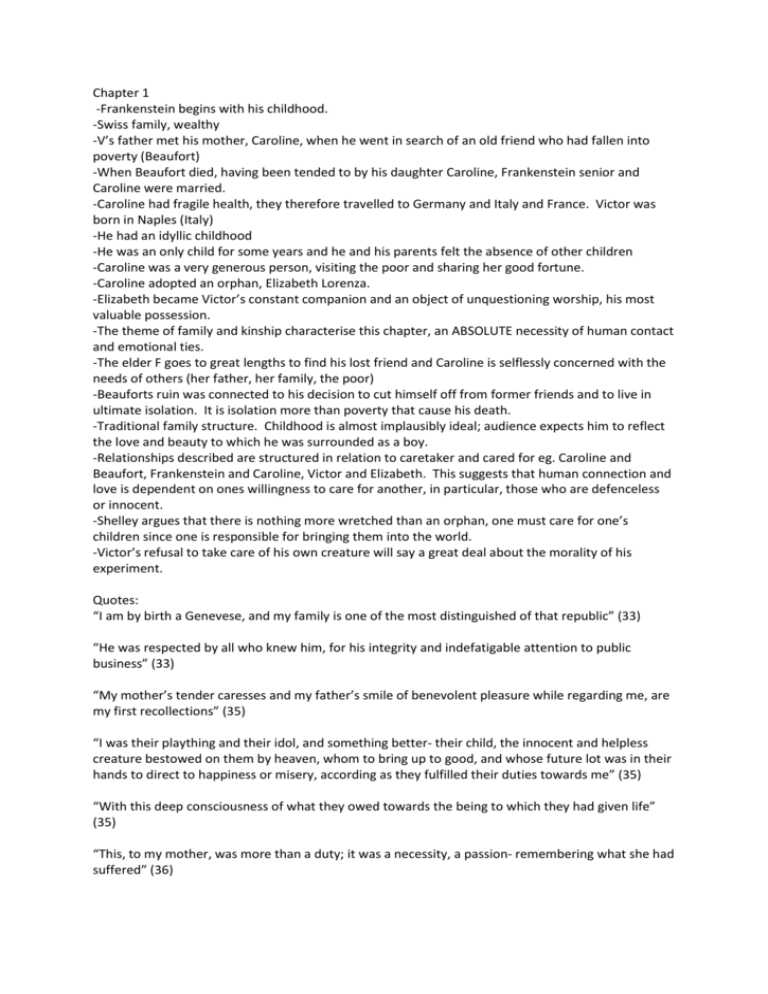
Chapter 1 -Frankenstein begins with his childhood. -Swiss family, wealthy -V’s father met his mother, Caroline, when he went in search of an old friend who had fallen into poverty (Beaufort) -When Beaufort died, having been tended to by his daughter Caroline, Frankenstein senior and Caroline were married. -Caroline had fragile health, they therefore travelled to Germany and Italy and France. Victor was born in Naples (Italy) -He had an idyllic childhood -He was an only child for some years and he and his parents felt the absence of other children -Caroline was a very generous person, visiting the poor and sharing her good fortune. -Caroline adopted an orphan, Elizabeth Lorenza. -Elizabeth became Victor’s constant companion and an object of unquestioning worship, his most valuable possession. -The theme of family and kinship characterise this chapter, an ABSOLUTE necessity of human contact and emotional ties. -The elder F goes to great lengths to find his lost friend and Caroline is selflessly concerned with the needs of others (her father, her family, the poor) -Beauforts ruin was connected to his decision to cut himself off from former friends and to live in ultimate isolation. It is isolation more than poverty that cause his death. -Traditional family structure. Childhood is almost implausibly ideal; audience expects him to reflect the love and beauty to which he was surrounded as a boy. -Relationships described are structured in relation to caretaker and cared for eg. Caroline and Beaufort, Frankenstein and Caroline, Victor and Elizabeth. This suggests that human connection and love is dependent on ones willingness to care for another, in particular, those who are defenceless or innocent. -Shelley argues that there is nothing more wretched than an orphan, one must care for one’s children since one is responsible for bringing them into the world. -Victor’s refusal to take care of his own creature will say a great deal about the morality of his experiment. Quotes: “I am by birth a Genevese, and my family is one of the most distinguished of that republic” (33) “He was respected by all who knew him, for his integrity and indefatigable attention to public business” (33) “My mother’s tender caresses and my father’s smile of benevolent pleasure while regarding me, are my first recollections” (35) “I was their plaything and their idol, and something better- their child, the innocent and helpless creature bestowed on them by heaven, whom to bring up to good, and whose future lot was in their hands to direct to happiness or misery, according as they fulfilled their duties towards me” (35) “With this deep consciousness of what they owed towards the being to which they had given life” (35) “This, to my mother, was more than a duty; it was a necessity, a passion- remembering what she had suffered” (36) “but it would be unfair to her to keep her in poverty and want, when Providence afforded her such powerful protection” (37) “she presented Elizabeth to me as her promised gift” (37) “mine to protect, love and cherish” (37) “All praises bestowed on her I received as made to a possession of my own” (37) “since till death she was to be mine only” (37) Chapter 2 -Family returns to Switzerland after the birth of their second son (Victor is 7) -Victor is friends with Henry Clerval and Elizabeth but does not invite friendship with others -Confesses to having a violent temper, not directed as other people but manifesting as a passionate desire to learn. -Clerval is fascinated by questions of morality, heroism and virtue. -Without Elizabeth, Victor’s passion for study might have become an obsession. -Victor’s memories of his childhood are pleasant -At thirteen, Victor becomes preoccupied with the question of how one might communicate with, or even raise, the dead. -Readers are introduced to Victor’s “thirst for knowledge” -Narrator begins to pick apart and identify aspects of his personality that will eventually lead to his downfall. -Thirst = necessary for survival -Shelley indicates that there is a compulsive quality to Victor’s scholarship-close to madness. -Elizabeth is positioned as a ‘saint’ -The influence of women/femininity is presented as offering hope of salvation- inspiring temperance and kindness. -Victor and Clerval are juxtaposed in that Clerval expresses himself openly through songs and plays, Victor, by contrast, does things privately. His reading is directed towards the learning of secrets of forbidden knowledge. -Victor is secretive and this plays an essential role in Victor’s scientific work and consequences -Victor ‘chances’ upon the volume of Cornelius Agrippa, bringing the question of chance and destiny. -He attempts to absolve himself of culpability for his later actions through placing blame on fate. “Harmony was the soul of our companionship” (38) “with all my ardour, I was capable of a more intense application, and was more deeply smitten with the thirst for knowledge” (38) “The world was to me a secret which I desired to divine” (38) “Curiosity, earnest research to learn the hidden laws of nature, gladness akin to rapture, as they were unfolded to me, are among the earliest sensations I can remember” (38) “Henry Clerval was the son of a merchant of Geneva. He was a boy of singular talent and fancy. He loved enterprise, hardship, and even danger for its own sake” (39) “No human being could have passed a happier childhood than myself” (39) “My temper was the secrets of heaven and earth that II desired to learn...the physical secrets of the world” (39) “Clerval occupied himself, so to speak, with the moral relations of things... his dream was to become one among those whose names are recorded in story, as gallant and adventurous benefactors of our species” (39) “the principles of Agrippa had been entirely exploded” (40) “I had gazed upon the fortifications and impediments that seemed to keep human beings from entering the citadel of nature, and rashly and ignorantly I had repined” (41) “I was, to a great degree, self-taught” (42) “My father was not scientific, and I was left to struggle with a child’s blindness, added to a student’s thirst for knowledge” (42) “I entered with the greatest diligence into the search of the philosophers stone and the elixir of life, but the latter soon obtained my undivided attention” (42) “what glory would attend the discovery, if I could banish disease from the human frame and render man invulnerable to any but a violent death!” (42) “Thus strangely are our souls constructed, and by such slight ligaments are we bound to properity or ruin” (43) “Destiny was too potent, and her immutable laws had decreed my utter and terrible destruction” (43)
